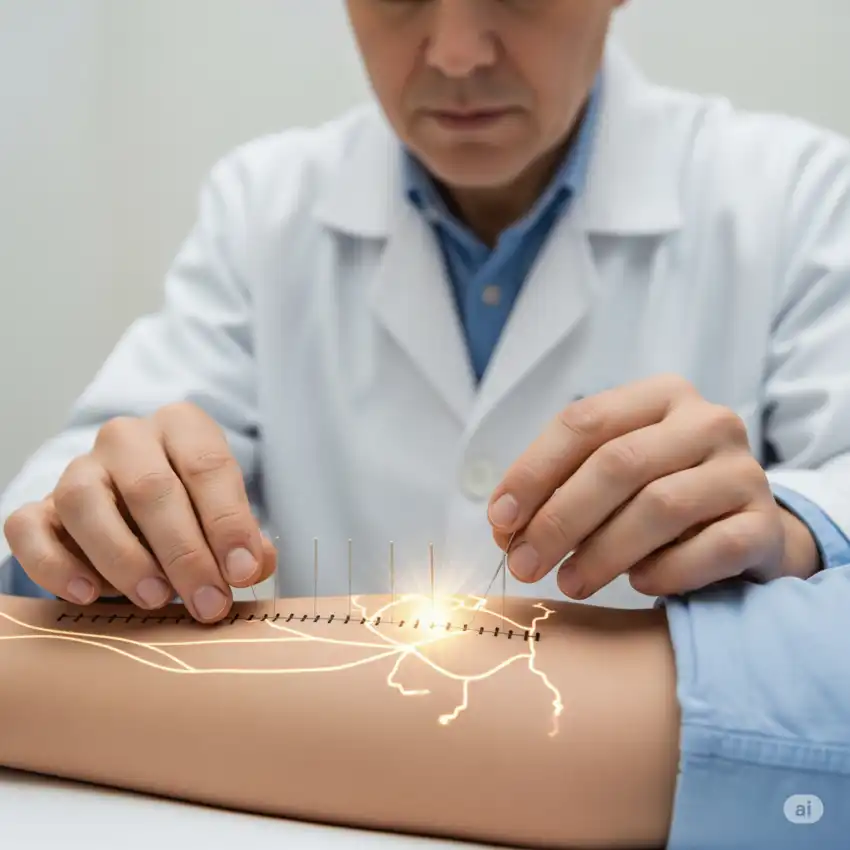Balancing Qi Through Seasonal Practices
By Kiran Wu / Feb 28
Have you ever pondered how the subtle flow of energy within your body can significantly impact your overall health? The meridian system in Traditional Chinese Medicine (TCM) offers profound insights into this connection, providing a roadmap to enhance well-being.
This visual illustrates the essential components of the meridian system and its connection to acupuncture, highlighting key functions, associated organs, and types of meridians.
Specific points that stimulate meridians, influencing various health conditions.
Restores balance, alleviates blockages, and fosters emotional well-being through meridian stimulation.
Have you ever felt a wave of calm after an acupuncture session? This sense of peace isn’t just happenstance; it stems from a profound understanding of the meridian system in Traditional Chinese Medicine (TCM). At The Meridian Connection, we delve into this fascinating world, exploring how meridians and the flow of qi are interwoven to enhance our overall health.
Meridians are the pathways through which qi—the vital life force—flows in our bodies. In TCM, these channels are crucial because they connect various organs and systems, facilitating energy exchange and harmony. Understanding meridians helps us unlock the potential for better health and well-being.
Each meridian corresponds to specific organs and emotions, indicating its significance in maintaining balance. When these pathways are clear and functioning optimally, energy can circulate freely, contributing to physical, emotional, and spiritual harmony.
Qi is much like a river that nourishes the land. When it flows smoothly through the meridians, we feel invigorated and aligned. However, blockages can occur due to stress, poor lifestyle choices, or emotional turmoil, resembling a dam that disrupts the natural flow of water.
By understanding how qi circulates through the meridians, we can take proactive steps to ensure our energy remains unimpeded. This knowledge is valuable for anyone exploring the principles of acupuncture, as it can guide personal practices that promote balance.
The twelve main meridians in TCM each have unique characteristics. They include:
Each of these meridians plays a vital role in our health. By exploring them further, we can gain insight into how they impact our physical and emotional states.
Each meridian corresponds to specific organs and has distinct functions:
By understanding these associations, we can identify which meridians may need attention during acupuncture treatments.
The Spleen and Lung meridians are particularly fascinating because they are often linked to our ability to absorb nutrients and defend against illness. The Heart and Kidney meridians, meanwhile, are pivotal in emotional balance, showing how interconnected our bodies truly are.
When we experience imbalances in these areas, it can lead to a range of health issues, reinforcing the importance of maintaining healthy meridian function.
The Gallbladder and Pericardium meridians also hold significant roles. The Gallbladder influences decision-making and courage, while the Pericardium protects the heart and regulates emotional expression. Recognizing the emotional aspects connected to these meridians helps us appreciate the holistic nature of TCM.
When we tap into the wisdom of these meridians, we can start to unveil the deeper layers of our health and emotional landscapes.
Acupuncture is a powerful method that targets specific meridian points to restore balance within the body. Learn more about acupuncture and its benefits here https://orientalmedicine.co.uk/acupuncture/ By stimulating these points, we can release blockages and promote the smooth flow of qi. It's akin to clearing a river's path, allowing energy to nourish body and mind.
This practice not only alleviates physical pain but also fosters emotional well-being, demonstrating the profound impact of meridian therapy.
In TCM, meridians can be categorized into three types: Jingmai (primary channels), Luomai (connecting channels), and Sinew channels. Each type serves distinct functions:
Understanding these variations allows us to tailor our acupuncture approaches for optimal results.
Acupuncture points act as gateways to the meridian system, each one connected to specific health conditions and benefits. For example, stimulating the LI4 point (located on the Large Intestine meridian) is known for its ability to alleviate headaches and promote relaxation. You can read more about how acupuncture helps with headaches and migraines in this detailed guide on acupuncture for migraines.
By learning about these points, you can better appreciate how acupuncture can be a transformative experience, guiding you toward improved health and vitality.
Recent studies have begun to explore the scientific basis of meridians, linking them to anatomical structures such as fascia and nervous systems. This emerging research validates ancient practices and brings modern understanding to the forefront, bridging the gap between tradition and science.
For a deeper dive into the research, explore studies on the anatomical basis of acupuncture from the National Institutes of Health (NIH), which is a reputable source for medical research.
At The Meridian Connection, we believe that recognizing these connections fosters a deeper appreciation for TCM and its relevance in our lives today.
Our nervous system plays a crucial role in how we experience pain and healing. The integration of meridians with fascial networks suggests that our body's communication systems are far more intricate than we previously understood.
This connection highlights the importance of acupuncture in stimulating not just the energy flow but also the nervous system's response, promoting a holistic approach to healing.
Energy channels serve as pathways for healing, allowing us to tap into our innate abilities to recover. By recognizing the role of meridians in this process, we begin to appreciate how acupuncture can activate these channels to restore balance and vitality.
Ultimately, understanding these elements empowers us to take charge of our health, fostering a greater connection with our bodies.
As we delve deeper into the meridian system, we discover practical applications that can enhance the efficacy of acupuncture treatments. By identifying specific meridian imbalances, practitioners can develop customized treatment plans that address individual needs.
This personalized approach not only maximizes benefits but also empowers patients to actively participate in their healing journeys.
At The Meridian Connection, we've witnessed remarkable outcomes through targeted acupuncture treatments. For instance, clients with chronic pain have experienced significant relief by focusing on specific meridians connected to their symptoms.
These case studies demonstrate the tangible benefits of understanding and applying meridian theory, inspiring others to explore their paths toward holistic wellness.
Integrating acupressure with needling techniques creates a dynamic way to enhance treatment outcomes. Acupressure can be used to prepare the body for acupuncture or maintain balance between sessions, reinforcing the connection between mind and body.
By applying these techniques, we can deepen our understanding of meridians while promoting a sense of well-being that resonates long after the treatment.
The concept of meridians has evolved over thousands of years, shaped by cultural beliefs and practices. Understanding this historical context enriches our appreciation of TCM and its wisdom.
You can read more about the historical roots and cultural significance of Traditional Chinese Medicine through resources like this article on Wikipedia.
At The Meridian Connection, we strive to preserve and share this knowledge, ensuring that the rich heritage of meridian theory continues to influence modern practices.
Cultural beliefs play a significant role in how meridian practices are interpreted and utilized. Different regions may emphasize various aspects of meridian therapy, leading to a diverse range of techniques and approaches.
By exploring these variations, we can cultivate a broader understanding of TCM and its applications in diverse contexts.
The principles of Yin and Yang and the Five Elements Theory are foundational to understanding meridians in TCM. These concepts illustrate how balance and harmony influence our health and energy flow, guiding our practices toward holistic wellness.
By recognizing these relationships, we can appreciate the depth of TCM and its potential for enriching our lives.
Did you know that maintaining a balanced lifestyle can significantly enhance the benefits of acupuncture? Incorporating practices such as regular exercise, balanced nutrition, and mindfulness can help keep your meridians clear and energy flowing. Consider integrating gentle activities like yoga or tai chi into your routine to complement your acupuncture treatments!
As we come to understand the depth of the meridian system and its connection to acupuncture, it becomes clear that these concepts are vital for achieving holistic health. The intricate balance of qi flowing through our meridians plays a significant role in how we feel and function every day. By recognizing the importance of this relationship, we can better appreciate how acupuncture serves as a powerful tool in restoring balance and promoting well-being.
Moreover, acupuncture is not just about needles; it’s about creating harmony within us. By tapping into the wisdom of the meridian system, we can unlock the potential for healing and energy restoration. This understanding allows us to engage more effectively with our health, leading to improved outcomes and enhanced vitality!
To summarize, let’s explore the core principles that demonstrate the importance of the meridian system in relation to acupuncture:
By embracing these key takeaways, we can take proactive steps toward better health. The ongoing relevance of meridian theory in modern health practices continues to be a guiding light for those seeking holistic approaches. Have you considered how these principles might apply to your own life?
Grasping the core principles of the meridian system can lead to significant improvements in health. It’s essential to recognize that when qi flows freely, our body operates optimally. Acupuncture, as practiced at The Meridian Connection, aims to clear any blockages that interrupt this flow and promote vitality.
Additionally, maintaining an awareness of personal energy levels can empower us to make informed decisions about our well-being. What practices can you implement to keep your meridians clear and your energy flowing? Simple actions, like mindfulness and gentle movement, can support this balance.
To deepen your understanding of the meridian system and its connection to acupuncture, visual aids and diagrams can be incredibly helpful. They can illustrate how qi moves through the body, enhancing your learning experience and making these concepts more accessible.
Let’s open the dialogue! How can your knowledge of meridians improve your acupuncture experience? Are there specific areas you’d like to explore further? I encourage you to reflect on these questions as you journey through your healing process.
Here is a quick recap of the important points discussed in the article:

 Balancing Qi Through Seasonal Practices
As the seasons change, so do our bodies and minds. The ancient wisdom of Traditional Chinese Medicin
Balancing Qi Through Seasonal Practices
As the seasons change, so do our bodies and minds. The ancient wisdom of Traditional Chinese Medicin
 Meridians and Chronic Pain Explained
Have you ever considered how ancient wisdom can illuminate modern health challenges? The fascinating
Meridians and Chronic Pain Explained
Have you ever considered how ancient wisdom can illuminate modern health challenges? The fascinating
 Meridian Blockages and Health Effects
Have you ever considered how the flow of energy within your body can impact your overall well-being?
Meridian Blockages and Health Effects
Have you ever considered how the flow of energy within your body can impact your overall well-being?